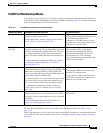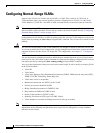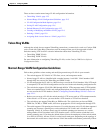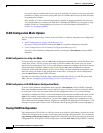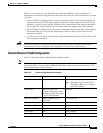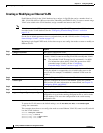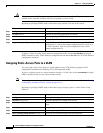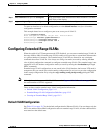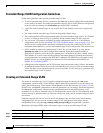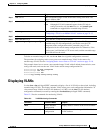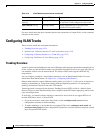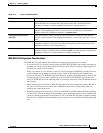
12-8
Catalyst 2960 Switch Software Configuration Guide
78-16881-01
Chapter 12 Configuring VLANs
Configuring Normal-Range VLANs
Creating or Modifying an Ethernet VLAN
Each Ethernet VLAN in the VLAN database has a unique, 4-digit ID that can be a number from 1 to
1001. VLAN IDs 1002 to 1005 are reserved for Token Ring and FDDI VLANs. To create a normal-range
VLAN to be added to the VLAN database, assign a number and name to the VLAN.
Note When the switch is in VTP transparent mode, you can assign VLAN IDs greater than 1006, but they are
not added to the VLAN database. See the “Configuring Extended-Range VLANs” section on
page 12-11.
For the list of default parameters that are assigned when you add a VLAN, see the “Configuring
Normal-Range VLANs” section on page 12-4.
Beginning in privileged EXEC mode, follow these steps to use config-vlan mode to create or modify an
Ethernet VLAN:
To return the VLAN name to the default settings, use the no name, no mtu, or no remote-span
config-vlan commands.
This example shows how to use config-vlan mode to create Ethernet VLAN 20, name it test20, and add
it to the VLAN database:
Switch# configure terminal
Switch(config)# vlan 20
Switch(config-vlan)# name test20
Switch(config-vlan)# end
Command Purpose
Step 1
configure terminal Enter global configuration mode.
Step 2
vlan vlan-id Enter a VLAN ID, and enter config-vlan mode. Enter a new VLAN ID
to create a VLAN, or enter an existing VLAN ID to modify that VLAN.
Note The available VLAN ID range for this command is 1 to 4094.
For information about adding VLAN IDs greater than 1005
(extended-range VLANs), see the “Configuring
Extended-Range VLANs” section on page 12-11.
Step 3
name vlan-name (Optional) Enter a name for the VLAN. If no name is entered for the
VLAN, the default is to append the vlan-id with leading zeros to the
word VLAN. For example, VLAN0004 is a default VLAN name for
VLAN 4.
Step 4
mtu mtu-size (Optional) Change the MTU size (or other VLAN characteristic).
Step 5
remote-span (Optional) Configure the VLAN as the RSPAN VLAN for a remote
SPAN session. For more information on remote SPAN, see Chapter 23,
“Configuring SPAN and RSPAN.”
Step 6
end Return to privileged EXEC mode.
Step 7
show vlan {name vlan-name | id vlan-id} Verify your entries.
Step 8
copy running-config startup config (Optional) If the switch is in VTP transparent mode, the VLAN
configuration is saved in the running configuration file as well as in the
VLAN database. This saves the configuration in the switch startup
configuration file.






